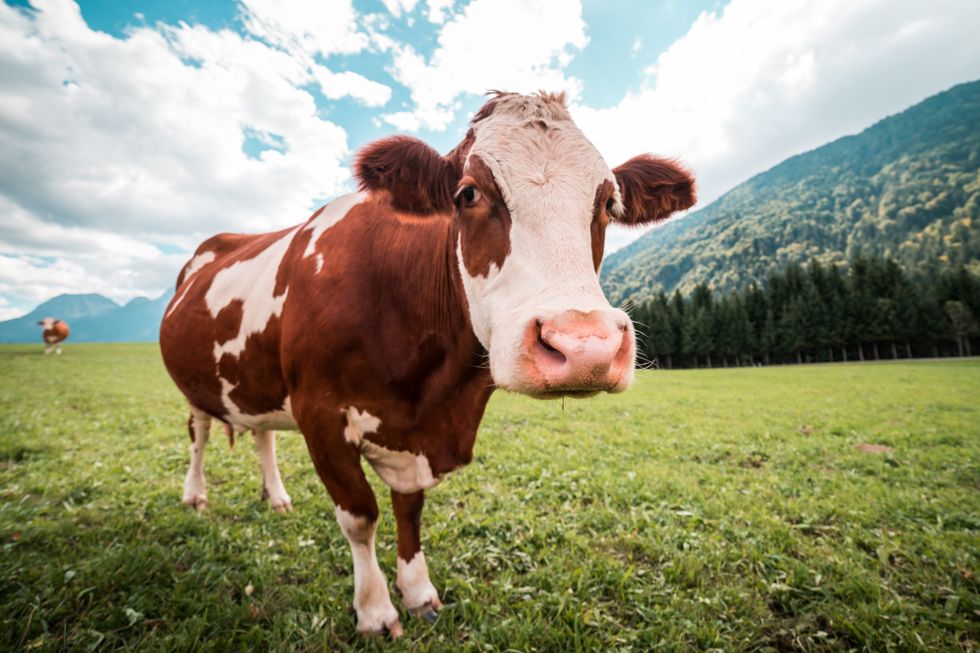Four years ago, I made a very disappointing decision in the eyes of my Mexican mother. Yes, four years ago, I became a vegetarian.
I grew up in a meat loving family. Every meal that my mom made was somehow meat inclusive: carnitas, enchiladas, menudo with lengua, chicken flautas, and steak at least once a week. Yeah, we ate pretty good growing up. Unfortunately, as I got older I became a lot more picky with what I ate, especially when it came to anything...fleshy. So, when I finally decided to stop eating meat, you can imagine my mom's dismay.
It all began the summer before my sophomore year of high school. That summer, I was going through a "watch every documentary on Netflix" phase. I found a documentary called "Cowspiricy" and it really made me question what I was consuming on a daily basis. After a lot of food related documentary binges, I was determined to never eat meat again.
The biggest factor (and maybe the only one) that steered me away from meat was the impact that its industry has on the environment. In case you weren't aware: agriculture is the biggest contributor to greenhouse gas emissions, climate change and resource depletion. Here's everything you need to know about the effects agriculture has on the environment according to "Cowspiricy":
The immediate buzz word for "oil industry" may be "climate change" for most people. The truth is fracking uses up to 140 billion gallons of water, but animal agriculture uses up to 76 trillion gallons of water (not to mention the methane emissions from both industries is pretty much neck and neck).
There are a lot of reasons for this - not just that living beings need water to survive and be healthy - but mostly because livestock consume very water exhaustive grains. If you really want to conserve water, don't just stick to ten minute showers, maybe you can try putting down the burger (a quarter pounder uses 660 gallons of water). Overall, animal agriculture accounts for 30 percent of the world's water consumption.
Let me digress and say that the oil industry is not nearly innocent in the race for "who can kill the Earth first" competition, but we are always stressing the danger of carbon emissions. That is what we teach our kids and it's what we are always, always trying to reduce, but carbon dioxide and energy emissions are not the only greenhouse gas. Animal agriculture produces tons of nitrous oxide (65 percent), which is a greenhouse gas that is 296 times greater than the warming potential of carbon dioxide. We are always trying to keep our energy use at bay, but the nitrous oxide emission is projected to increase by 80 percent in the next fifty years. As the population grows, so does the demand for meat and dairy.
Transporting your beef, chicken, etc. contribute 13 percent of all greenhouse gas emissions. That may seem like a very small number, but in the scheme of billions of people who drive cars, it actually is a pretty decent slice of the pie. Your produce comes from all over the world. It can travel hundreds of miles to get to your local supermarket (if it doesn't already intimidate you that the animals you put in your body are coming to you via semi-truck and/or cargo ship).
To top it all off (or as much as I could say without boring anyone to death), animal agriculture takes up 45 percent of Earth's land. This may not seem so staggering to some people, so just entertain the thought that the world population is projected to increase by over 2 billion people. This would only necessitate more land use for food and the destruction of natural habitats and ecosystems to accommodate that change. It's terrifying considering agriculture is already responsible for 91 percent of amazon depletion.
Okay so rant and random statistics aside, when all of these factors are totaled up, animal agriculture accounts for just over half of human caused climate change. This includes respiration, methane, and loss of carbon sinks (big, healthy trees). Also not to mention the contribution it makes to the water crisis.
So...that's the main reason I went vegetarian. It's sort of like my silent protest to the man, whoever that may be; and honestly, after learning about the impact meat has on the environment, I only felt more guilty for consuming it.
You may have reached the pretty near end of this article and read all the way through. In which case, I applaud you. I hope I somewhat inspired you, but if you're one of those dedicated meat lovers, I implore you: buy local. Support local and small farms! The biggest offenders in this story are big companies like Tyson and so many fast food chains. If you're from the midwest, I guarantee you can find a local farmers market where you can even meet the cow you'll eventually eat.
If you're also curious, I've definitely found a lot of health benefits to vegetarianism. Especially within the first few months: clearer skin, easier digestion, and way more energy after eating. Due to the lack of a whole food group, I've found a lot more interesting vegetables, fruits, nuts, and lentils to eat. Truth is, vegetarians consume way less saturated fat and way more vitamins, fiber, potassium, magnesium, etc. It's also pretty well known that vegetarians live longer. Which means we'll be around even longer to annoy you.









































